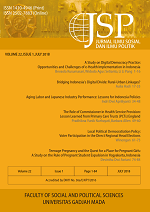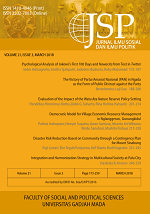Ekonomi Politik Perminyakan Indonesia: Analisis Kebijakan Liberalisasi Sektor Hulu Migas Indonesia pasca-1998
https://doi.org/10.22146/jsp.10911
Ahmad Rizky Mardhatillah Umar
(1*)
(1) Universitas Gadjah Mada
(*) Corresponding Author
Abstract
In the early of 2012, The Government of Indonesia launched a policy proposal remove fuel price subsidy and raise its price up to Rp 6.000. This proposal was followed by mass protests from student, labor, and civil society movement in many provinces. These protest, which was supported by opposition party in parliament (PDIP, Gerindra, and Hanura), ended up with a political compromy at the House of Representative plenary session: The government has opportunity to adjust fuel prices with ‘international oil price’ of Indonesian Crude Price (ICP) rises or falls around 15% in 6 months. Why do the fuel pricing scheme become very dependent with international oil price which is very oligopolistic (Berger dkk, 1988)? Is it a part of the oligarchy consolidation in Indonesia (Robison dkk, 2004)? This paper will try to answer this question by analyzing the political economy of Post-1998 Indonesian oil sector management.
Keywords
Indonesian Oil Policy; Capital Absorption; Neoliberal Globalization; Oligarchic Capitalism; Kebijakan Minyak Indonesia; Penghisapan Kapital; Globalisasi Neoliberal; Kapitalisme Oligarkis
DOI:
https://doi.org/10.22146/jsp.10911
Article Metrics
Abstract views : 6952
|
views : 7773
Refbacks
There are currently no refbacks.
Copyright (c) 2016 Jurnal Ilmu Sosial dan Ilmu Politik
<div class="statcounter"><a title="Web Analytics" href="http://statcounter.com/" target="_blank"><img class="statcounter" src="//c.statcounter.com/10932543/0/2e122c85/0/" alt="Web Analytics"></a></div> <div class="statcounter"><a title="Web Analytics Made Easy - StatCounter" href="http://statcounter.com/" target="_blank"><img class="statcounter" src="//c.statcounter.com/10932543/0/2e122c85/0/" alt="Web Analytics Made Easy - StatCounter"></a></div> View My Stats






















